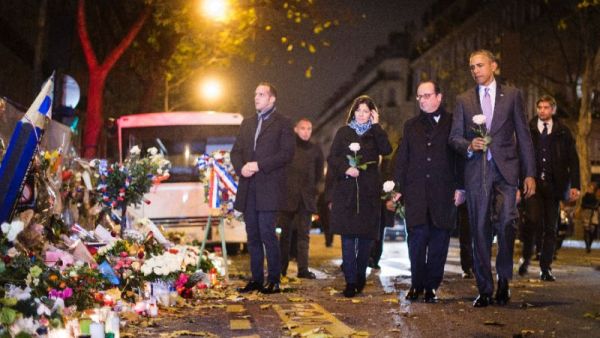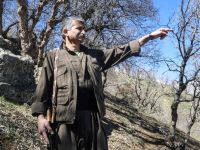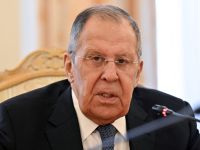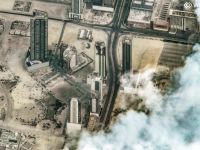Eleanor Beevor
This is Part II of a three part series exploring ISIS returnees in Belgium, France and the United Kingdom.
In 2016, a highly controversial book was published featuring a series of interviews with the then-French President Francois Hollande. Hollande, a man of the Socialist left-wing party, let loose a number of unexpected soundbites.
But one that was met with particular shock abroad was his blunt admission that French intelligence services had “…a list of people who are believed to be responsible for hostage takings or acts against our interests”. If security forces located those individuals, he said, they had his permission to “…take revenge measures”. Those on the list were French citizens who had left to join ISIS in Iraq and Syria.
>
Hollande was not the only high-profile French politician to be so blunt, then or now. The new administration of centrist Emmanuel Macron also maintains a hardline stance. Defence Minister Florence Parly told reporters in late 2017, “What we want is to go to the end of this combat and of course if jihadists die in the fighting, then I’d say it’s for the best”.
Westerns governments, at least in the pre-Trump era, preferred to speak of killings by their foreign intelligence services in more delicate terms, or ideally never speak of them at all. Calls for obedience to international law abroad are less convincing when one’s own dirty laundry is aired in public.
But France’s unapologetic position that a dead French jihadist was preferable to a live one coming home was perhaps shocking, but certainly not surprising. Whatever one’s view of the ethics of killing French jihadists on foreign soil - and there are plenty of ethical questions to ask - it would have been practically impossible for the government, even Hollande’s leftist one, to take a different line. For France has undoubtedly suffered the worst among European nations at the hands of terrorists.
Terror in Paris
On January 7th 2015, gunmen stormed the offices of the controversial satire magazine Charlie Hebdo, where they shot twelve people. A policewoman was shot in the suburb of Montrouge the following day. And on January 9th, two more attackers stormed a Kosher supermarket, taking hostages and killing four people before themselves being killed by police.
On November 13th 2015, 150 people were murdered on the streets of Paris and in a packed concert venue by a group of nine jihadists, at least three of whom had fought for ISIS in Syria. And then in July 2016, 86 people were killed in the city of Nice while celebrating Bastille Day, when a young French-Tunisian man drove a truck into the boulevard where people were gathered, and managed to drive for 2km through crowds before being shot by police.
Given the trauma that these incidents wreaked on France’s people, combined with a persistent public view of Hollande’s administration as weak on security, it was hardly surprising that both Hollande and later Macron were desperate to look tough on terror.
And despite the dubious legality of France’s strikes on its active foreign fighters, there was very little public resistance to the idea of taking out armed men on ISIS’s battlefields, French or otherwise. It might not convince every international human rights lawyer, but such armed individuals could arguably be called legitimate military targets under the laws of war.

Frenchman Maxime Hauchard, an ISIS foreign fighter, allegedly executed a Syrian soldier (AFP)
But there are plenty of cases of French foreign fighters who do not fall into such convenient categories. In order to qualify as a legitimate military target, a person must be actively taking part in fighting. It is perfectly likely that a number of French foreign fighters would qualify. But the term “foreign fighter” is a misleading one, for a lot of those who travelled to join ISIS did not actually end up fighting.
In 2014, French newspaper Le Figaro published excerpts from letters from French ISIS members that expressed regret at having gone to Syria, as well as wishes that they could come home. One wrote “I've done practically nothing but hand out clothes and food. I also clean weapons and transport dead fighters’ corpses.” Another expressed the reverse concern, saying “They want to send me to the front even though I don’t know how to fight."
Whether the letters provoke any sympathy or not, both of those individuals – legally speaking - qualified as “hors de combat” (outside of combat), at least at the time of writing.
They thus would not be legitimate targets for military strikes. This raises troubling questions about the dozens of “foreign fighters” who have been killed on French orders. One report suggested that President Hollande personally approved the killings of forty French ISIS members.
Nevertheless, France has made clear that it has little desire to repatriate and try those returnees who committed terrorist offences off the battlefield. The case of Emilie König illustrates this.
The story of König, a young woman from a white, middle class family in Brittany who once worked as a nightclub barmaid, and who travelled to Syria and became a notorious recruiter for ISIS, both fascinated and horrified France. In January 2018, König was captured and arrested by Kurdish forces. Now the Kurds want to try her in their own courts.
Her mother said that König was desperate to return to France, and had asked for forgiveness from the French state. But despite concerns that she would not receive a fair trial in a Kurdish court, the French government said that she must face trial in Syria. Their justification was that König had not voluntarily surrendered.
“They were arrested in combat. They have been arrested, and as far as we know they did not surrender of their own accord,” said a French government spokesman. König remains incarcerated, and it is unclear what will happen to her, or to her three children who are also in Syria.
But France was unable to prevent all its foreign fighters coming home – a considerable number succeeded. As of last year, 271 returnees were known to have reached France. 54 of these are minors. Interior Minister Gerard Collomb has insisted that all these individuals are subject to investigation by public prosecutors, while some are in prison.
Given that over 2000 French citizens left to join ISIS in the first place, that may appear a relatively small number of returnees. But France’s security services are already stretched.15,000 French citizens have been flagged as radicalisation risks. Further high-risk suspects coming back from Syria are an unwelcome added burden.
But the problem for the security services is one of manpower and resources rather than one of legislation. For better or for worse, French police now have few legal constraints to worry about when it comes to detaining or prosecuting suspects. As well as granting special forces a free rein when it came to killing foreign fighters, Hollande also set in place changes to the constitution, and to security legislation, which swept aside a number of regulations police might face when investigating cases of suspected terrorism.
Hollande demanded police be allowed to raid the homes of potential suspects without warrants. Police can now detain suspects of terrorism without a lawyer for up to four hours, and can place a travel ban on suspects considered a flight risk. Sweeping measures were instituted that allowed websites that “glorified terrorism” to be blocked.
In regard to returned foreign fighters, police can place returnees under house arrest for up to a month, and they can also fit those previously convicted of terrorism offences with an electronic bracelet to monitor their movements.

Emilie Konig, a 33-year-old French woman suspected of recruiting fighters for Islamic State and now in the custody of the Kurdish Syrian People’s Protection Units, speaking at an undisclosed location in Syria (AFP)
One cannot blame France for seeking all the protections it can in the wake of the tragic attacks it experienced. But it must be asked whether these new police powers come with risks of their own. When legislation is loose and police can act first and ask questions later, there is a lot more room for mistakes. And such mistakes would add fuel to the fire of tensions between French authorities, and the many disenfranchised French Muslims.
France’s complicated relationship with religion in general, and Islam in particular, is well known. The code of laïcité– the separation of religion and public life – is one of the most dearly held tenets of republican France. Whilst this nominally inhibits all faiths from expression in government affairs, it has hit Muslims especially hard.
This is partly because of the greater visibility of some Muslim religious symbols such as the hijab or niqab. But it’s exacerbated by a historical distrust of Muslim immigrants. And this distrust, and the resulting discrimination, is extremely evident across all too many sectors of French life.
The discomfort around Muslim head coverings began long before “radicalisation” entered the political lexicon. “L’affaire des foulards”, as it became known in the press, was a contentious public scandal involving a state school in the town of Creil, which suspended three Muslim students for not removing their headscarves when asked to do so by their teachers. That was in 1989. Back then, those defending the teachers justified the position by saying that total religious freedom could not afford uneven religious expression in public spheres – including education.
The law eventually ruled in favour of allowing individual schools to decide whether or not to ban visible signs of religious affiliation. A later piece of legislation in 2004 also banned the niqab, the full face-veil. The ghost of the “l’affaire des foulards” controversy was resurrected by the temporary ban on the “burkini” in 2016. This forbade women from wearing the full-body swimsuit in public pools and beaches. On this occasion, terrorism concerns were used to justify the ban.
Whether this ban represented the same Islamophobia in new clothes, or a fresh defence of laïcité in the face of present concerns was very much in the eye of the beholder. But the fact is that this rigid rejection of Muslim women’s attire has been a genuine grievance for a majority of Muslims, many of whom are deeply offended that their French identity is being questioned.
And it has also been one of the most ubiquitous features of jihadist propaganda directed toward Muslims in France. Jihadist movements including ISIS constantly frame this tension around headscarves as proof that France is inherently hostile to Islam.
Indeed, Emilie König only began to wear the niqab after it was banned. A film-maker who interviewed her before she left for Syria said that though König’s gesture was intentionally provocative, each insult she received wearing it in the street hurt her on a personal level, and further convinced her that she needed to take radical steps to fulfil her Islamic obligations. But the tensions between the French state and French Muslims are far from limited to clothing.
French Muslims, although particularly the North African immigrant population who arrived in the 1960s and their descendants, are extremely economically marginalized. This is for a mix of reasons. The low-paid manual jobs that the first generation did have been declining, which made for a disadvantaged start for their children. The general economic climate has not helped.
But racism and discrimination against Muslims are prevalent, and contribute to keeping a new generation in a precarious, and frustrating position.
Tensions are also deeply felt in the Muslim community’s relationship with the police, something that further relaxing police powers around terrorism suspects could exacerbate. Muslims make up 12% of France’s population, but represent over 60% of the inmates in French prisons. Prisons refuse to provide halal meat, adding another grievance to the arsenal of Islamist recruiters attempting to radicalize their fellow inmates.

Three women wearing the hijab join a protest march in 2003 against the French government’s decision to ban the Islamic headscarf in schools, hospitals and public buildings (AFP)
France’s prison radicalisation problem is extreme. The government currently has 1600 people in prison on terrorist offences who are deemed to be radicalized, including returnees. But while Hollande’s government tried to prioritise de-radicalization within the prison system, the new administration believes that Islamist prisoners are too dangerous to be allowed to mingle with other inmates and need to be separated. It is instead planning to create specialized jail places for radicalized inmates.
The problem, as many analysts see it, is that the French prison system’s hostility towards Islam extends to the religion’s potential for de-radicalization programs. Unlike its European neighbours, France has been reluctant to involve religious figures who can offer more peaceful interpretations of Islam.
The prison system is instead focused almost entirely on trying to prevent further violence by its current inmates. However, a near-exclusive focus on security fails to offer an alternative identity or ideology for those who will one day be released. The current prison process instead risks entrenching the belief of Islamist prisoners’ that France will never accept them.
The same goes for any foreign fighters who return to France. They will face time for the terrible crimes that many of them committed. And given their decision to join a terrorist group, suspicion towards those individuals is quite justified.
But if it wants to protect itself from further attacks, France also needs to give its deprived Muslim population hope. Hope that they might be able to prosper one day. Hope that the authorities will view them as citizens first, not suspects. And hope that they will be accepted as French without needing to change who they are.
The views expressed in this article do not necessarily reflect those of Al Bawaba News. Part I here.







